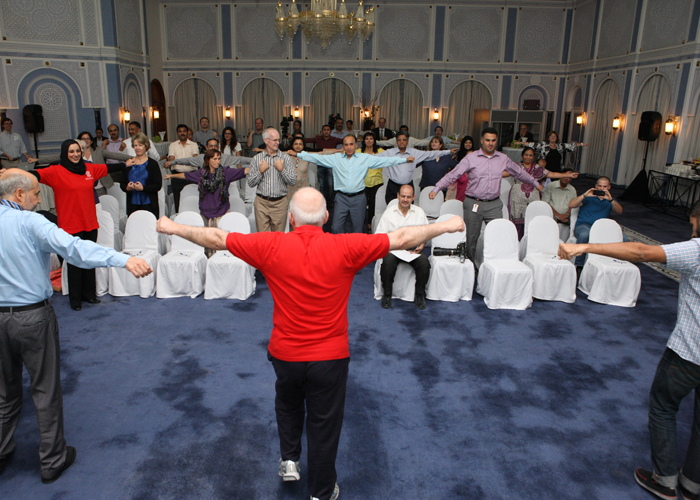WCMC-Q expert explains benefits of physical activity
September, 2014

Dr. Verjee leads the audience in an impromptu workout.
The huge range of health benefits that exercise and regular physical activity bring were outlined in the latest edition of WCMC-Q’s Ask the Expert series.
The interactive public talks are part of the college’s Sahtak Awalan – Your Health First campaign and aim to help the public understand health matters and encourage them to make positive changes to their lives.
Dr. Mohamud Verjee, associate professor of family medicine at WCMC-Q, gave the latest talk.
Speaking at the event at the Diplomatic Club, Doha, Dr. Verjee explained and demonstrated the best way to start and continue exercising for those who want to be physically active, keep healthy and maintain normal weight limits.
First, he said people should take a good look at their eating habits. Breakfast is the most important meal of the day as it kick-starts body metabolism, and should not be missed. Studies have shown that eating a healthy breakfast can help the body burn 25% more calories throughout the day. By eating complex carbohydrates in cereals like sugar-free muesli, wholegrain bread, and adding fresh fruit, natural laban or yoghurt, people can keep their energy levels up throughout the day, reducing the likelihood of fatigue.
Before exercising, Dr. Verjee reminded the audience of the importance of warming up, to help lubricate joints and avoid muscular strains. Load bearing exercises with light weights should be done first as this burns off excess carbohydrates, followed by flexibility exercises, and rounding off with cardio, which burns off fat. Pre-loading with water is vital, and regular fluid intake during exercise activity is imperative. Feeling thirsty during activity means a state of water deprivation, placing needless stress on the heart. A serious lack of water during prolonged exercise can cause physical and mental disturbances, leading to loss of hand-eye coordination, confusion and increased risk of injury. Cooling down for about five minutes after a thirty-minute period of exercise is firmly recommended for aerobic body action, avoiding stiffness and discomfort from excess lactic acid build-up that may occur during activity.
Dr. Verjee reminded the audience that exercise and physical activity did not have to be a hardship. A cumulative thirty minutes each day, even if divided into three periods of ten minutes, will help people keep fit. Five days activity out of seven with a couple of days off allows the body time to rest and recuperate. Joining gymnasiums or sports clubs are not essential either, as one can exercise at home, in parks as a family, or even in malls when it is excessively hot outside. The important principle is to be regularly active. The benefits of physical activity are significant. Muscle mass is maintained or increased, and this tissue burns more calories, reducing weight gain. Muscle is “King” or “Queen” depending on gender!
Exceeding a normal BMI and developing diabetes is less likely, and the likelihood of a stroke is reduced as is heart disease and osteoporosis. Exercise also relieves and reduces depression. A good night’s sleep is important, and daily exercising improves its quality. The best time to exercise is in the morning after breakfast, and the worst time late in the day. But exercise taken at any time is better than none.
By taking care of your own health, you are then better able to take care of your family and friends, and live life to the fullest.
